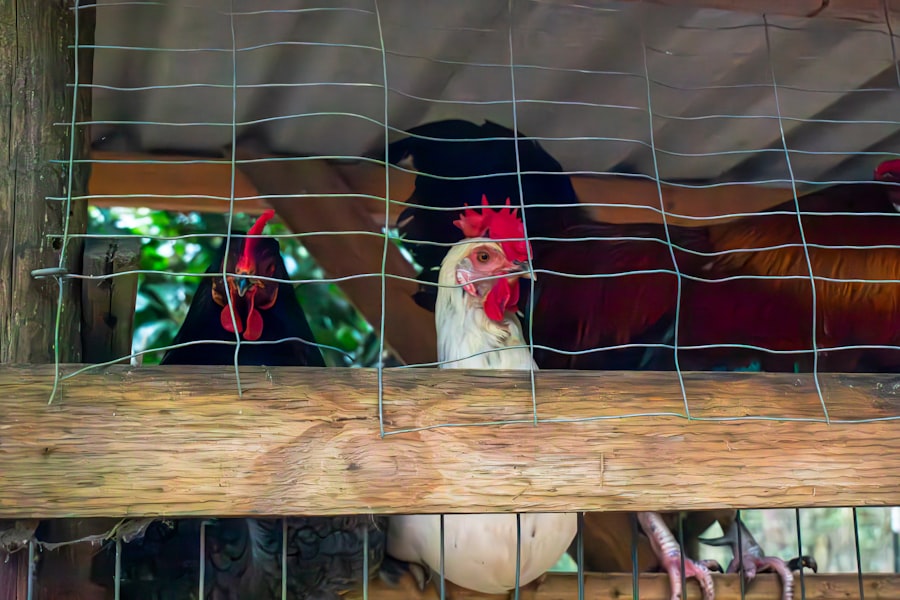Understanding chicken behavior is essential for successful poultry management. Chickens are social creatures with a complex hierarchical structure within their flock, known as the pecking order. This social system consists of dominant and submissive individuals.
Observing and comprehending flock dynamics is crucial for maintaining the birds’ well-being and optimizing productivity. Chickens possess innate behaviors such as foraging, dust bathing, and roosting. Providing an environment that accommodates these natural instincts is vital for their physical and psychological health.
Farmers should create spaces that allow chickens to engage in these activities freely. Chickens communicate through various vocalizations and body language. These include clucking, squawking, and specific postures that indicate their emotional state and needs.
Farmers who can accurately interpret these signals are better equipped to identify and address potential issues within the flock promptly. By understanding chicken behavior, farmers can design appropriate housing and management practices that promote the birds’ welfare and enhance their productivity. This knowledge enables the creation of a suitable environment that meets the chickens’ biological and behavioral requirements, leading to healthier and more productive flocks.
Table of Contents
- 1 Providing appropriate feed and nutrition
- 2 Implementing effective fencing and barriers
- 3 Using distractions and enrichment
- 4 Training and discipline
- 5 Seeking professional advice
- 6 Monitoring and adjusting strategies
- 7 FAQs
- 7.1 What are some common things that chickens like to eat?
- 7.2 Why is it important to keep chickens from eating certain things?
- 7.3 How can I keep chickens from eating harmful things?
- 7.4 What are some common foods that are harmful to chickens?
- 7.5 Are there any plants that are toxic to chickens?
- 7.6 Can chickens eat table scraps?
Key Takeaways
- Chickens have complex social structures and communication methods, and understanding their behavior is crucial for their well-being.
- Providing a balanced diet with appropriate feed and nutrition is essential for the health and productivity of chickens.
- Effective fencing and barriers are necessary to protect chickens from predators and to keep them in designated areas.
- Using distractions and enrichment activities can help prevent boredom and reduce stress in chickens.
- Training and discipline techniques can be used to manage chicken behavior and establish boundaries.
- Seeking professional advice from veterinarians or experienced chicken keepers can provide valuable insights and guidance.
- Regularly monitoring and adjusting strategies for chicken care is important to ensure their welfare and productivity.
Providing appropriate feed and nutrition
Components of a Balanced Diet
The diet should include a mix of grains, protein sources, vitamins, and minerals to meet the specific nutritional needs of chickens at different stages of life.
Access to Clean Water and Digestive Aids
It’s important to provide access to clean water at all times to prevent dehydration and ensure proper digestion of food. Additionally, offering grit or small stones can help chickens grind their food in their gizzards, aiding in digestion. Farmers should also be mindful of any dietary restrictions or special requirements for certain breeds or individual chickens.
Monitoring and Adjusting Nutrition
Monitoring the body condition of the chickens can also help farmers assess if they are receiving adequate nutrition. Overweight or underweight chickens may indicate an imbalance in their diet that needs to be addressed. Regularly consulting with a poultry nutritionist or veterinarian can help farmers develop a feeding program that meets the specific needs of their flock.
Implementing effective fencing and barriers

Implementing effective fencing and barriers is crucial for keeping chickens safe from predators and preventing them from wandering into unwanted areas. Fencing should be sturdy and tall enough to prevent predators from digging under or climbing over it. Additionally, using wire mesh with small openings can help keep out smaller predators like raccoons or weasels.
Barriers such as chicken wire or netting can also be used to create designated areas within the chicken coop or run, separating different groups of chickens or protecting specific plants from being damaged by foraging chickens. It’s important to regularly inspect fences and barriers for any signs of wear or damage to ensure they remain effective in protecting the flock. Implementing effective fencing and barriers is crucial for keeping chickens safe from predators and preventing them from wandering into unwanted areas.
Fencing should be sturdy and tall enough to prevent predators from digging under or climbing over it. Additionally, using wire mesh with small openings can help keep out smaller predators like raccoons or weasels. Barriers such as chicken wire or netting can also be used to create designated areas within the chicken coop or run, separating different groups of chickens or protecting specific plants from being damaged by foraging chickens.
It’s important to regularly inspect fences and barriers for any signs of wear or damage to ensure they remain effective in protecting the flock.
Using distractions and enrichment
Using distractions and enrichment activities can help prevent boredom and reduce stress in chickens. Providing objects such as hanging mirrors, perches, or even simple toys can stimulate their natural curiosity and provide mental stimulation. Additionally, scattering treats or food in different areas of the coop or run can encourage foraging behavior, keeping chickens engaged and active.
Enrichment activities such as providing access to dust baths, fresh vegetation, or even allowing them to free-range in a supervised area can also contribute to their overall well-being. These activities mimic their natural behaviors in the wild and can help reduce any negative behaviors that may arise from boredom or stress. Using distractions and enrichment activities can help prevent boredom and reduce stress in chickens.
Providing objects such as hanging mirrors, perches, or even simple toys can stimulate their natural curiosity and provide mental stimulation. Additionally, scattering treats or food in different areas of the coop or run can encourage foraging behavior, keeping chickens engaged and active. Enrichment activities such as providing access to dust baths, fresh vegetation, or even allowing them to free-range in a supervised area can also contribute to their overall well-being.
These activities mimic their natural behaviors in the wild and can help reduce any negative behaviors that may arise from boredom or stress.
Training and discipline
Training and discipline are important aspects of managing chicken behavior. Chickens can be trained to respond to certain cues or commands, making it easier to manage them in various situations. Positive reinforcement techniques such as using treats or praise can be effective in training chickens to perform specific behaviors or follow instructions.
Consistency is key when implementing training and discipline strategies with chickens. Establishing clear boundaries and rules within the flock can help prevent unwanted behaviors such as aggression or excessive pecking. Using gentle but firm discipline when necessary can help reinforce these boundaries and maintain a harmonious environment within the flock.
Training and discipline are important aspects of managing chicken behavior. Chickens can be trained to respond to certain cues or commands, making it easier to manage them in various situations. Positive reinforcement techniques such as using treats or praise can be effective in training chickens to perform specific behaviors or follow instructions.
Consistency is key when implementing training and discipline strategies with chickens. Establishing clear boundaries and rules within the flock can help prevent unwanted behaviors such as aggression or excessive pecking. Using gentle but firm discipline when necessary can help reinforce these boundaries and maintain a harmonious environment within the flock.
Seeking professional advice

Expert Guidance
These professionals can offer guidance on nutrition, health care, housing, and behavior management. Their expertise can help you develop tailored strategies that meet the specific needs of your flock.
Networking Opportunities
Joining local poultry associations or online forums can provide opportunities to connect with other chicken farmers and exchange knowledge and experiences. This networking can offer valuable support and resources for managing chicken behavior effectively.
Developing Effective Strategies
By seeking professional advice and networking with other professionals in the industry, you can develop effective strategies for managing your chicken’s behavior. This can lead to a healthier and more productive flock.
Monitoring and adjusting strategies
Monitoring the effectiveness of behavior management strategies is essential for ensuring the well-being of the flock. Regularly observing the behavior of the chickens can help farmers identify any changes or issues that may require adjustments to their management strategies. Keeping detailed records of any behavioral patterns or incidents can also provide valuable insights into the overall dynamics within the flock.
Flexibility is important when managing chicken behavior, as different strategies may need to be adjusted based on the individual needs of the chickens or changes within the environment. Being open to adapting management techniques based on feedback from professionals or observations within the flock can help ensure a positive and healthy environment for the chickens. Monitoring the effectiveness of behavior management strategies is essential for ensuring the well-being of the flock.
Regularly observing the behavior of the chickens can help farmers identify any changes or issues that may require adjustments to their management strategies. Keeping detailed records of any behavioral patterns or incidents can also provide valuable insights into the overall dynamics within the flock. Flexibility is important when managing chicken behavior, as different strategies may need to be adjusted based on the individual needs of the chickens or changes within the environment.
Being open to adapting management techniques based on feedback from professionals or observations within the flock can help ensure a positive and healthy environment for the chickens.
If you’re looking for tips on how to keep chickens from eating things they shouldn’t, you might also be interested in this article on whether geese can eat chicken feed. It’s important to know what types of food are safe for different types of poultry to prevent any potential health issues.
FAQs
What are some common things that chickens like to eat?
Chickens are omnivores and will eat a variety of foods including grains, seeds, insects, fruits, and vegetables.
Why is it important to keep chickens from eating certain things?
Some foods can be harmful to chickens and may cause health issues or even be toxic. It’s important to monitor their diet to ensure they are getting the proper nutrition and to prevent any potential harm.
How can I keep chickens from eating harmful things?
You can keep chickens from eating harmful things by providing them with a balanced diet, keeping their living area clean and free of potential hazards, and supervising their access to certain areas or items.
What are some common foods that are harmful to chickens?
Foods that are harmful to chickens include chocolate, avocado, onions, garlic, and foods high in salt or sugar. Additionally, moldy or spoiled foods should be avoided.
Are there any plants that are toxic to chickens?
Yes, there are several plants that are toxic to chickens including rhubarb, nightshade plants (such as tomatoes and potatoes), and certain ornamental plants like azaleas and lilies.
Can chickens eat table scraps?
Chickens can eat certain table scraps such as fruits, vegetables, and grains. However, it’s important to avoid feeding them foods that are high in salt, sugar, or fat, as well as any foods that are toxic to chickens.
Meet Walter, the feathered-friend fanatic of Florida! Nestled in the sunshine state, Walter struts through life with his feathered companions, clucking his way to happiness. With a coop that’s fancier than a five-star hotel, he’s the Don Juan of the chicken world. When he’s not teaching his hens to do the cha-cha, you’ll find him in a heated debate with his prized rooster, Sir Clucks-a-Lot. Walter’s poultry passion is no yolk; he’s the sunny-side-up guy you never knew you needed in your flock of friends!







